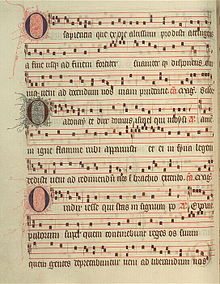o (interjection)
O is a particle and the shortest word in the German language . It functions as a vocative article , although it is rarely used nowadays as an archaism . Lexically , o is a primary interjection . O is often confused with the identical but differently used interjection oh .
Use as a vocative
In German, the word ending of a noun in the vocative is often the same as that in the nominative , whereby the article is either omitted or can be replaced by o to make the vocative more recognizable . Examples of the vocative use of o can be found in the Christmas carols O Tannenbaum and O du cheerful or in everyday language in the idioms “oh man!”, “Oh my God!” Or “oh how beautiful”. The vocative effect of o can include both a simple salutation and a phone call (e.g. a threat or warning).
O has the same meaning in other Indo-European languages . For example, Canada's national anthem is called " O Canada " in both English and French .
Further examples:
- O old fellow glory
- O Brother, Where Art Thou?
- O Captain! My captain!
- O dear Augustine
- O tempora, o mores
First publication of the student song O old Burschenherrlichkeit (1825)
Walt Whitman's poem O Captain! My captain! with handwritten revisions
O antiphons
During Advent The O-antiphons sung in Vespers in the last days of Advent from December 17th to 23rd each start with a pictorial address of the expected Messiah taken from the Old Testament and lead to the cry “Veni!” “Come!” . The designation of the antiphons is derived from the invocation "O" with which each of the antiphons begins. These invocations have also found their way into German hymn poems in the Advent songs:
- O Savior, tear open the heavens , 1622
- Oh come, oh come, Immanuel , 1722
Difference to Oh
The interjection oh , which has the same name but is used differently, is used as an exclamation of astonishment or surprise.
See also
literature
- Johann Christian August Heyse : Dr. Joh. Christ. Aug. Heyses German grammar. Or textbook of the German language. P. 586.
Web links
Individual evidence
- ↑ Wolfgang Hock: Can every form of address also be a phone call? (PDF; 133 kB), footnote 2
- ↑ oh . ( Wiktionary )


